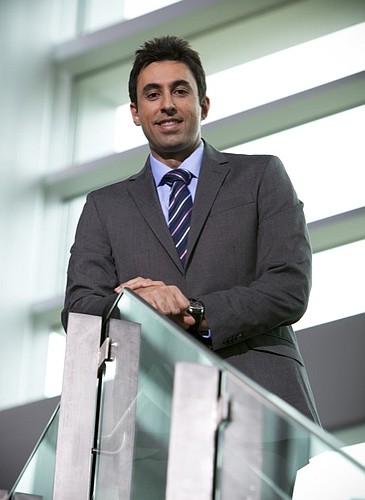- November 26, 2024
-
-
Loading

Loading

A popular joke among academics begins with a physicist, a chemist, and an economist on a desert island, each trying to think up a plan for getting back to shore. After the first two scientists offer their ideas, the economist says, “Assume a boat.”
The joke plays off economics' reputation for relying on assumptions, perhaps the most important of which is rationality: For economic analyses to yield useful results, consumers must be assumed to behave rationally.
Ali Besharat, a graduate student at University of South Florida's College of Business, is challenging that most paramount assumption with his research. He says he's found a scenario where consumers regularly behave irrationally, spending more money than they should whenever this phenomenon takes place.
He calls the scenario prepayment. It's when a consumer spends a significant amount of resources — be they money, time, effort -- just for the opportunity to make a purchase. When consumers make a significant prepayment, Besharat argues, they tend to increase their spending on the purchase that follows.
The idea first struck Besharat while reviewing his own spending habits. Specifically, he looked at the receipts from his visits to Starbucks, and concluded that he was regularly spending more money on coffee and food when he spent more time waiting in line on a particular trip.
He hypothesizes: “Consumers unconsciously tend to lose self-control and over-consume when they make a prepayment with currencies such as money, time, or effort,” he argues. “Consumers behave this way because they base their decisions on past costs, rather than future costs.”
To test his claim, Besharat surveyed undergraduate students. The experiments confirmed his suspicions, and now Besharat is applying for funding to pay for access to a larger sample size to bolster the strength of his research.
Besharat's hypothesis testing will continue over the next year, but already the creative thinker has thought of ways managers can make use of his findings. One example: already-popular restaurants might be able to extract more revenue per table by requiring patrons to put down a small deposit when making a reservation that will later go toward their tab. Because the patron has already parted ways with the money, Besharat suggests, he might be willing to buy more food once he sits down than if no deposit had been made.
Indeed, Besharat can point to ad campaigns currently running across the country that utilize his strategy. For instance, Burger King has rented out Channel 111 on DirecTV for its “WhopperLust” advertisement, which gives viewers a coupon for a free Whopper after watching the channel for five minutes. By requiring consumers to invest time and effort before making their purchase, Besharat's research suggests the campaign will draw a strong redemption rate, plus high potential for an upsell. In the campaign's first week, Burger King gave away 50,000 Whoppers.
Even Black Friday, one of the country's most widely talked-about retail events, can be better understood through Besharat's research. When consumers wait in line for eight hours or more, that prepayment of time and effort causes them to want to spend more when they get in the store. Why not purchase this vacuum cleaner, a buyer might ask, even though I came here for a TV?
Regardless of the outcome of his current project, Besharat says he plans to stay in Tampa, likely to continue his work as a marketing researcher.
Besharat earned both a bachelor's degree and an M.B.A. at Sharif University of Technology in Tehran, the capital of Iran. But North America is the place to be for marketing research, he says.